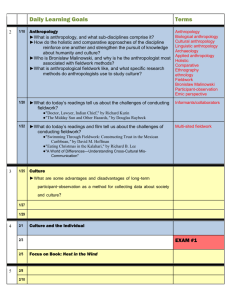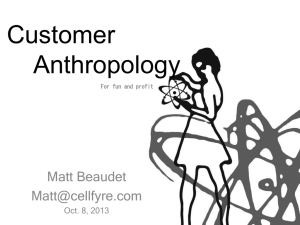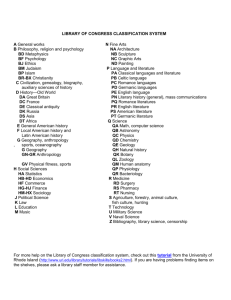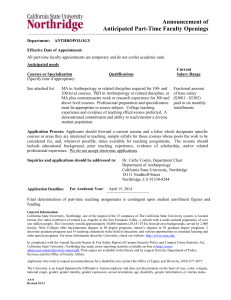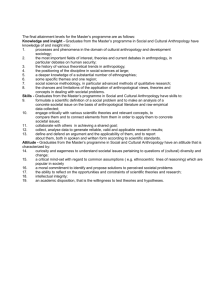ANT-101-Week-1-Quiz-914008362
advertisement
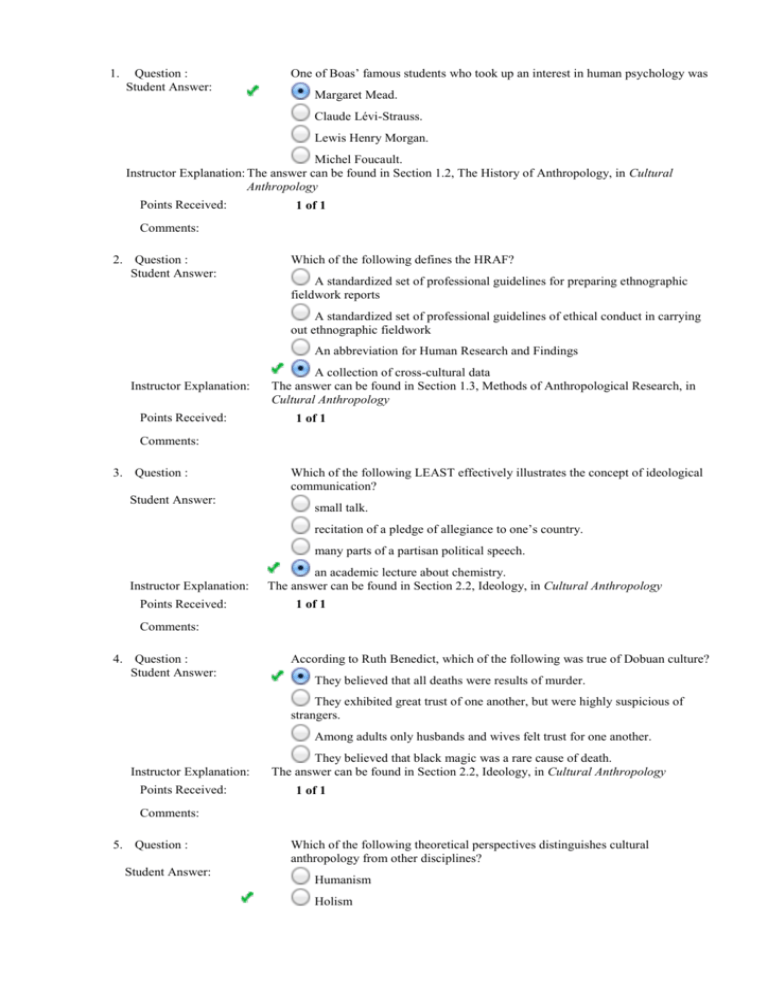
1. Question : Student Answer: One of Boas’ famous students who took up an interest in human psychology was Margaret Mead. Claude Lévi-Strauss. Lewis Henry Morgan. Michel Foucault. Instructor Explanation: The answer can be found in Section 1.2, The History of Anthropology, in Cultural Anthropology Points Received: 1 of 1 Comments: 2. Question : Student Answer: Which of the following defines the HRAF? A standardized set of professional guidelines for preparing ethnographic fieldwork reports A standardized set of professional guidelines of ethical conduct in carrying out ethnographic fieldwork An abbreviation for Human Research and Findings Instructor Explanation: Points Received: A collection of cross-cultural data The answer can be found in Section 1.3, Methods of Anthropological Research, in Cultural Anthropology 1 of 1 Comments: 3. Question : Student Answer: Which of the following LEAST effectively illustrates the concept of ideological communication? small talk. recitation of a pledge of allegiance to one’s country. many parts of a partisan political speech. Instructor Explanation: Points Received: an academic lecture about chemistry. The answer can be found in Section 2.2, Ideology, in Cultural Anthropology 1 of 1 Comments: 4. Question : Student Answer: According to Ruth Benedict, which of the following was true of Dobuan culture? They believed that all deaths were results of murder. They exhibited great trust of one another, but were highly suspicious of strangers. Among adults only husbands and wives felt trust for one another. Instructor Explanation: Points Received: They believed that black magic was a rare cause of death. The answer can be found in Section 2.2, Ideology, in Cultural Anthropology 1 of 1 Comments: 5. Question : Student Answer: Which of the following theoretical perspectives distinguishes cultural anthropology from other disciplines? Humanism Holism Materialism Instructor Explanation: Ethnocentrism The answer can be found in Section 1.1, The Breadth of Anthropology, in Cultural Anthropology Points Received: 0 of 1 Comments: 6. Question : Student Answer: Which of the following did Edward Sapir believe about culture? Culture exists in the interactions of specific individuals and in the world of meanings which each individual perceives. Culture is a “superorganic” phenomenon. Culture is a neatly packaged assembly of forms that is handed over from one generation to the next. Instructor Explanation: Points Received: Children are not active participants in their own enculturation. The answer can be found in Section 2.4, Viewpoints about Culture, in Cultural Anthropology 0 of 1 Comments: 7. Question : Student Answer: In Jules Henry’s view, how are values and drives related to each other? Values determine how people behave, while drives are ways of acting that are required by circumstances. Values are what people care enough to follow through on, while drives are followed out of necessity. Values are ideals that people do not necessarily pursue, while drives are the motives people actually pursue. Instructor Explanation: Points Received: They are synonyms. The answer can be found in Section 2.2, Ideology, in Cultural Anthropology 1 of 1 Comments: 8. Question : Student Answer: The main difference between cultural relativists and moral relativists is that cultural relativists claim that “anything goes.” moral relativists believe there are no universal moral standards. cultural relativists believe we must abandon our values when studying others. Instructor Explanation: Points Received: moral relativists believe that we must not accept personally repugnant customs. The answer can be found in Section 1.4, Cultural Differences, in Cultural Anthropology 0 of 1 Comments: 9. Question : Student Answer: Anthropology is unique because it bridges psychology and sociology. the past and present. the sciences and the humanities. morality and material life. Instructor Explanation: The answer can be found in Section 1.1, The Breadth of Anthropology, in Cultural Anthropology Points Received: 1 of 1 Comments: 10. Question : Student Answer: How are the terms morality and piety related in this text? Piety is a form of morality. Morality is a form of piety. Morality controls relationships between people, while piety controls relationships with the supernatural. Instructor Explanation: Points Received: Comments: Both are kinds of beliefs. The answer can be found in Section 2.2, Ideology, in Cultural Anthropology 1 of 1




